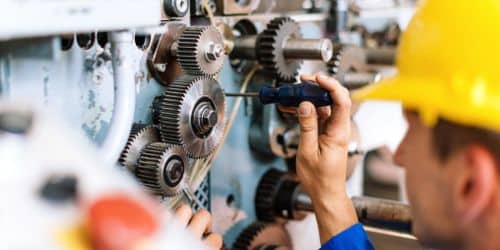As much as we want it, the perpetual operation of equipment is simply not possible in the real world. Regular maintenance is necessary for industrial processes to maintain worker safety, increase business revenues, and conform to legal requirements. By 2026, it is anticipated that the industrial maintenance industry would be worth $701.3 billion globally due to expanding populations and rising consumer demand. You need a strategy for asset maintenance if your company depends on equipment or plants to function. Making a maintenance schedule in advance will help you avoid having to stop production because of costly breakdowns or mistakes. This post will discuss Industrial Maintenance Schools in Tennessee, what Industrial Maintenance Technician does, their salary, Companies that use their services, and the six steps to becoming a Technician.
What is Industrial Maintenance?
Implementing procedures to lower breakdowns, boost uptime, and advance general reliability is known as industrial maintenance, commonly referred to as plant maintenance. In other terms, maintenance refers to any activities that are done to keep assets in excellent operating order.
Production activities are also maintained when equipment continues to operate at its predicted capacity. A maintenance plan lowers maintenance expenses, enhances possible uptime, and ultimately boosts profitability.
A sustainable maintenance strategy does not include relying on a third-party service contractor to fix malfunctioning parts after the fact. This strategy increases your risk of unplanned downtime due to a sudden, unexpected breakdown in addition to the high servicing costs with third-party contractors.
A good maintenance schedule can pinpoint tasks that should be performed to avoid breakdowns altogether, thereby saving your business more money.
Who Are Considered Industrial Maintenance Workers?
Mechanics and engineers make up the two primary groups of maintenance workers. There would be distinct primary areas of accountability for each group. These groups can carry out their particular specialized jobs more effectively by setting up clear accountabilities.
#1. Industrial Maintenance Mechanic
Industrial maintenance mechanics are necessary for many sectors. Simply said, a maintenance mechanic is necessary for every business that employs machinery with moving parts.
The installation, disassembly, repair, and maintenance of machinery are among the general responsibilities of a mechanic.
#2. Industrial Engineer
Industrial engineers create procedures that they guarantee can be executed effectively and efficiently. By organizing, creating, and putting into practice a company’s operations, they maximize resources. Industrial engineers can choose which maintenance procedures to utilize by using mathematical models and analysis tools.
What Are Other Types of Industrial Maintenance Workers?
You can anticipate other employees who help with the maintenance of the plant on the floor in addition to the mechanics and engineers. Examples of these maintenance personnel are shown below.
#1. Maintenance Technician
The preferred personnel for general maintenance tasks is maintenance technicians. Typically, they are given tasks in groups that will work together to complete them. Tasks include numerous complex-level preventative and reactive maintenance procedures.
It makes sense that technicians are uncertain about maintenance mechanics. The range of responsibilities that these two roles manage is the primary distinction between them. In general, maintenance professionals choose a more specialized skill set.
#2. Maintenance Planner
The maintenance planner comes in handy because mechanics and technicians can only do their work properly if they have the necessary parts on hand. The maintenance planner makes sure that the necessary parts are accessible in time for an activity that is scheduled. Also, the maintenance planner would also act as the maintenance scheduler in smaller businesses.
#3. Maintenance Supervisor
The maintenance supervisor of the facility oversees the work being done by the technicians. The supervisor makes rounds to make sure that tasks are completed promptly and by the planned timeline. Additionally, the supervisor needs to routinely coordinate with the maintenance planner and scheduler. In this manner, the manager may see the tasks at hand and allocate resources appropriately.
Industrial Maintenance Schools in Tennessee
Heavy/industrial equipment maintenance is about averagely popular regarding degree programs. In other words, it is ranked #195 out of the 395 majors we examine nationally each year. Finding reliable schools that offer Industrial Maintenance degree programs in Tennessee may therefore require some research on your part.
This list can be useful for that. For the 2023 ranking of the Best Heavy/Industrial Equipment Maintenance Schools in Tennessee, there was only one school to evaluate.
It’s crucial to arm yourself with as much information as you can before selecting the best school for you. To assist you in choosing a college, we’ve created a number of rankings for various majors, including this list of the Best Heavy/Industrial Equipment Maintenance Schools in Tennessee.
Best Schools for Heavy/Industrial Equipment Maintenance in Tennessee
See the list below to learn which schools are generally the best at providing education for the equipment maintenance degrees they offer if you aren’t interested in a specific degree level.
#1. Lincoln College of Technology – Nashville
If you want to study heavy/industrial equipment maintenance, it’s challenging to outperform Lincoln College of Technology-Nashville. Lincoln Tech – Nashville is a private, for-profit university with a small student body that is situated in the sizable city of Nashville.
Earnings for graduates with degrees in heavy/industrial equipment maintenance from Lincoln College of Technology – Nashville is about $3,370 higher than the average for graduates in this field.
Industrial Maintenance Technician
An expert mechanic who installs, fixes, and maintains industrial machinery is known as an industrial maintenance technician. They typically operate in small factories or industrial facilities where they oversee the efficient operation of internal production machinery.
Jobs in maintenance make sure that equipment is kept in good operating order and stops faults before they start. When a machine or piece of equipment malfunctions, they are also in charge of identifying and resolving the issue.
Six Steps to Becoming an Industrial Maintenance Technician
Step 1: Research industrial maintenance technician Duties
Candidates who are interested in this vocation should learn about the regular duties they will handle. This will guarantee that you are prepared for this field of work well before your first day on the job.
Step 2: Investigate industrial mechanic education
It’s time to think about what kind of higher education this vocation takes if you enjoy disassembling things, learning how things operate, and working with your hands.
Industrial maintenance technicians must possess a GED or the equivalent high school diploma. Beyond that, completing a brief certificate program or a two-year associate industrial maintenance degree, with or without an apprenticeship, is becoming the norm for technicians.
Step 3: Enroll in a program for industrial technicians.
Building up your maintenance skills before applying for a job is a good idea, just like with any vocation. Candidates should be proactive, detail-oriented problem solvers. They should also be very good at managing their time and communicating.
Industrial service technician certificate programs are excellent places to learn these abilities. Students learn how to install, troubleshoot, repair, and maintain complex mechanical and electrical industrial requirements in these full- and part-time programs.
Step 4: Complete your internships and/or training
Industrial maintenance employees and technicians generally undergo more than a year of on-the-job training in addition to their coursework and the experience they acquire in a certificate or associate program.
During that time, new industrial technicians perform common duties and get on-the-job expertise in blueprint reading, computer programming, electronics, proper tool use, shop mathematics, and welding.
Step 5: Prepare your resume
Now that you’ve completed your chosen degree and obtained the requisite abilities, it’s time to build your résumé. Be sure to highlight your experience, skills, and qualifications to convince possible employers you are ready to contribute to the sector of maintenance.
Step 6: Apply for jobs and begin your career
The industrial machinery sector is a booming field of potential. Maintenance of industrial equipment can involve everything from ball bearings and tools to compressors, valves, and even major pieces of gear like bulldozers and cement mixers. Candidates find work in aviation, construction, electronics, energy, food, and manufacturing.
Industrial Maintenance Salary
As of May 9, 2023, the average annual salary for an industrial maintenance technician in the United States is $50,102 per year. Just in case you need a basic salary calculator, that comes out to be around $24.09 an hour. This is the equivalent of $963/week or $4,175/month.
While ZipRecruiter is seeing annual salaries as high as $66,500 and as low as $28,000, the majority of Industrial Maintenance Technician salaries currently range between $42,000 (25th percentile) and $57,500 (75th percentile), with top earners (90th percentile) making $64,000 annually across the United States.
The average salary range for an Industrial Maintenance Technician varies substantially (by as much as $15,500), which shows there may be many prospects for promotion and improved pay dependent on skill level, location, and years of experience.
Based on recent job posts on ZipRecruiter, the Industrial Maintenance Technician job market in both Atlanta, GA and the surrounding area is quite active. Industrial Maintenance Technicians in your area make an average yearly salary of $50,357, which is $0 (0%) less than the $50,102 national average. According to the salary for an industrial maintenance technician, Georgia is ranked 50th out of the 50 states.
Industrial Maintenance Companies
Companies providing maintenance services for industrial gear come in a wide variety of shapes and sizes. Although many manufacturers of industrial equipment provide maintenance and repair services for their products, there are many businesses whose primary focus is on offering equipment and machine maintenance and repair services for the goods produced by other manufacturers. The best industrial maintenance and repair companies are listed below.
#1. Advanced Technology Services
Advanced Technology Services (ATS) offers solutions for asset management and equipment maintenance, as well as industrial maintenance and MRO services. The business assists clients with measuring production outcomes and optimizing plant maintenance. ATS was established in 1895 and has offices all around the world and in the US, with a headquarters in Peoria.
#2. Astro Machine Works
Astro Machine Works, established in 1984 in Ephrata, Pennsylvania, serves clients all over the world with machine maintenance services, bespoke machine building, precision parts machining, and component reverse engineering. The business provides services to a variety of markets, including healthcare and pharmaceuticals, energy, food processing, aerospace, electronics and semiconductors, telecommunications, and packaging.
#3. Caterpillar Inc.
Caterpillar is one of the biggest manufacturers of mining and construction equipment in the world With headquarters in Deerfield, Illinois, and a family of 21 brands. The business offers equipment, engines, turbines, locomotives, and more to the transportation, resource, and construction industries. Additionally, it provides maintenance and repair services as well as other services and solutions for its products.
#4. CNH Industrial
CNH Industrial is a multinational capital goods firm that develops, manufactures, and markets machinery for the transportation, construction, and agricultural sectors. Also, CNH, which has offices in Amsterdam, the Netherlands, and Basildon, England, runs 67 production facilities and 56 R&D facilities in 180 nations.
#5. Deere & Company
Since its founding in 1837, John Deere has served customers in the US and all over the world by offering a variety of equipment for forestry, construction, agriculture, and other uses. The corporation, with its headquarters in Moline, Illinois, operates factories, offices, and other facilities in more than 30 different nations. Its machinery and equipment products have sensors and software that are integrated into them to track status, alert users to potential problems, and schedule maintenance.
#6. Exline, Inc.
Since its founding in 1872, Exline has provided manufacturing and industrial repair services. The company performs machinery maintenance and repairs for a wide range of markets and uses, including gas compression, industrial manufacturing, power generation, and compacting of polymers and rubber. The machinists, mechanics, and technicians of Exline, which has its headquarters in Salina, Kansas, offer industrial machinery repair services both on-site and at their facilities.
Which Industries Utilize Industrial Maintenance?
Any business that owns and runs machinery needs to perform some kind of industrial maintenance. Here are a few real-world instances of how industrial maintenance is applied in various fields.
#1. Food processors
Food processing facilities use a variety of sophisticated and delicate technology, such as automated food preparation machinery like peelers and sorters. Ovens, cookers, and fryers are other large-scale culinary appliances that you might anticipate. Massive refrigeration units may be needed at other facilities as well to preserve raw materials or finished goods.
#2. Refineries
Refineries require a lot of heat and chemistry to run. Extreme pressures, temperatures, and compounds that could corrode are all present. Reactors, heat exchangers, furnaces, and boilers all require routine maintenance.
#3. Energy
Energy is used significantly in both commercial and residential settings around the clock, seven days a week. The energy sector now has a great deal of pressure to perform with the highest level of dependability. A thorough industrial maintenance strategy would need to include every component needed to harness, create, and even distribute energy.
#4. Construction
Companies that manufacture building materials use a variety of heavy machinery and equipment. These consist of motors, conveyors, CNC equipment, milling machines, and other devices. These parts frequently require a lot of force, which translates to an equal level of wear and tear.
#5. Printing presses
Repetitive motion is used by printing presses to reliably generate large quantities of output. Equipment is prone to material stress and fatigue due to its continual rotation. A maintenance strategy should be in place for printing presses, especially for those that have been in use for a while.
Industrial Maintenance Qualifications and Certificates
There are numerous professional associations and certificates for those who work in industrial maintenance.
#1. Certified Maintenance & Reliability Technician (CMRT)
It is a thorough certification that covers basic maintenance management, maintenance practices, preventative and predictive maintenance, troubleshooting and analysis, and corrective maintenance. It is administered by the Society for Maintenance and Reliability Professionals (SMRP).
#2. Certified Maintenance & Reliability Professional (CMRP)
This article, which is also from the SMRP, addresses business and management, machinery dependability, manufacturing process reliability, leadership and organization, and task management. Accredited by the American National Standards Institute (ANSI).
#3. Certified Facility Manager (CFM)
The International Facility Management Association (IFMA) provides personnel with leadership and operational idea training in addition to technical details of facility upkeep. The company provides many different educational options.
#4. Facilities Management Professional (FMP)
Professionals in facility management who wish to enhance both their hard and soft abilities can enroll in this degree program through IFMA. The four modules address project management, leadership and strategy, operations and maintenance, and finance and business. It is advertised by the organization as a “must-have credential for facility professionals.”
#5. Essentials of Facility Management
This curriculum from IFMA is different from others in that it is better suited for professionals who are just beginning their careers in the sector. The ten courses cover the fundamentals of FM and aid in laying a solid foundation for important ideas.
#6. Certified Plant Engineer (CPE)
For facility maintenance, electrical, civil, and mechanical engineering, OSHA safety, and energy management, the Association for Facilities Engineering (AFE) offers training and certification.
#7. ProFM Credential
This certification, which covers the “24 things every FM professional should know,” covering operations and maintenance as well as how to manage assets, risk, and business, is offered by the ProFMI Commission, which also includes Stormy Friday and Stan Mitchell.
What Are the Types of Industrial Maintenance?
Curative maintenance, corrective maintenance, predictive maintenance, systematic preventive maintenance, and conditional preventive maintenance are the five different types of industrial maintenance.
What Do You Learn in Industrial Maintenance?
Workers who maintain industrial machinery often undergo more than a year of on-the-job training to become proficient in regular operations like assembling, cleaning, lubricating, and starting machines.
What Is the Need for Industrial Maintenance?
Preventive industrial maintenance also increases safety by lowering the chance of accidents, fatalities, and consequent responsibility brought on by faulty or failing assets.
How Do I Start Industrial Maintenance?
Important Moves to Make to Become an Industrial Maintenance Mechanic:
- Investigate courses for industrial maintenance mechanics.
- Develop your skills as an industrial maintenance mechanic.
- Do a Relevant Internship or Training.
- Research industrial maintenance mechanic duties.
- Get your resume ready.
- Try to get a job as an industrial maintenance mechanic.
What Is Another Name for Industrial Maintenance?
Implementing procedures to lower breakdowns, boost uptime, and advance general reliability is known as industrial maintenance, commonly referred to as plant maintenance.
Conclusion
By minimizing expensive downtime and repairs, industrial maintenance enables businesses to maximize the returns on their investments in assets and machinery. There are several maintenance tactics, from reactive to proactive to even predictive, because there are so many different sorts of assets and each one can have a varied amount of importance.
Related Articles
- INDUSTRIAL GOODS: Meaning, Characteristics, Types of Buyers
- COMPUTER TECHNICIAN: Meaning, Salary, Skills, Courses & Repairs
- TOP 33 HIGHEST-PAYING JOBS WITHOUT A DEGREE OR EXPERIENCE IN 2023
- DEVELOPMENT BANKS: Beginners’ Guide with Examples (+Best picks)
- INDUSTRIAL AUTOMATION: Definition, Examples, Companies & Importance






